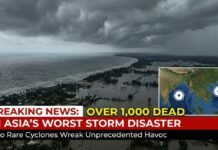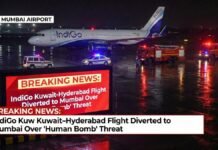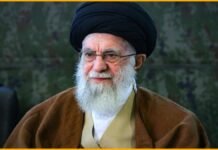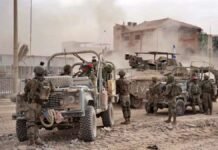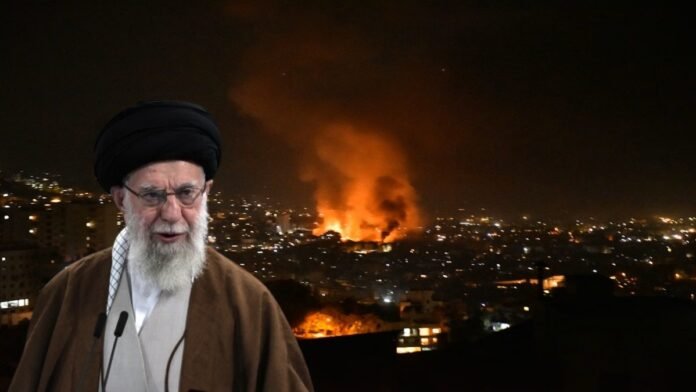
Key Points
- Iranian Supreme Leader Ayatollah Ali Khamenei officially declared war on Israel, vowing “no mercy” in a series of posts on X.
- Iran launched overnight missile barrages at Israel, including hypersonic missiles, triggering widespread air raid sirens.
- Israel responded with major airstrikes on Tehran, targeting military and nuclear sites.
- Both nations issued evacuation orders for civilians in targeted areas.
- Civilian casualties are mounting, with at least 224 killed in Iran and 24 in Israel so far.
- Israeli Defense Minister Israel Katz warned Khamenei of a fate similar to Saddam Hussein if attacks on Israel continue.
- The international community, including the US, is urging restraint as fears of broader regional escalation grow.
Tehran: The long-simmering hostilities between Iran and Israel have exploded into open warfare, with both nations exchanging deadly missile and air strikes across their territories. The conflict, now in its sixth day, has already claimed hundreds of lives and left both Tehran and Tel Aviv reeling under the threat of further escalation.
Khamenei Declares War: “No Mercy” for Israel
In the early hours of Wednesday, Iranian Supreme Leader Ayatollah Ali Khamenei took to X (formerly Twitter), declaring, “The battle begins. We must give a strong response to the terrorist Zionist regime. We will show the Zionists no mercy”. His posts, accompanied by religious and historical imagery referencing the Battle of Khaybar, signaled a shift from proxy confrontations to direct state-on-state warfare.
Minutes after Khamenei’s declaration, Iran unleashed two waves of ballistic missile barrages on Israel. The first attack, shortly after 12:40 a.m., involved around 15 projectiles, followed by a second barrage of approximately 10 rockets 40 minutes later. Air raid sirens blared across central Israel and the West Bank, sending residents scrambling for shelter.
Iran’s Islamic Revolutionary Guard Corps claimed to have fired hypersonic Fattah-1 missiles, boasting that their strikes were “repeatedly shaking the shelters” in Tel Aviv. The attacks sparked fires in central Israel, damaging cars but causing no immediate reported injuries in this round. However, previous barrages have resulted in at least 24 Israeli civilian deaths and hundreds injured.
Israel Strikes Back: Air Raids on Tehran and Military Targets
Israel responded swiftly and forcefully. The Israeli Air Force launched a new wave of airstrikes on Tehran, targeting weapons manufacturing sites, missile launch facilities, and a centrifuge plant used in Iran’s nuclear program. Residents in District 18 of Tehran were ordered to evacuate as the military warned of imminent action against regime infrastructure.
Since the conflict began on June 13, Israel has struck dozens of Iranian military and nuclear targets under “Operation Rising Lion.” These strikes have killed several senior Iranian military and intelligence leaders, top nuclear scientists, and at least 200 Iranian civilians, according to Iranian sources. Explosions have rocked Tehran, Isfahan, and other strategic sites, with some buildings collapsing and fires breaking out in residential areas.
Civilian Impact and Warnings
Both sides have issued evacuation orders for civilians in targeted zones. Israeli Defense Minister Israel Katz emphasized that Israel does not seek to harm Tehran’s civilian population but warned that residents would “pay the price” by being displaced as strikes continue against regime targets.
Meanwhile, Iranian retaliatory strikes have targeted key Israeli cities, including Tel Aviv, Haifa, and Rehovot. The Weizmann Institute of Science, a critical hub for Israeli research, suffered significant damage in the attacks.
Rhetoric and Threats Escalate
The war of words has intensified alongside the military confrontation. Israeli Defense Minister Katz warned Khamenei to remember the fate of Saddam Hussein, the Iraqi dictator overthrown and executed after defying Israel and the West. Prime Minister Benjamin Netanyahu has not ruled out targeting Iranian leadership, suggesting such action could end the conflict.
Khamenei’s rhetoric has remained defiant, framing the conflict in ideological and religious terms and vowing continued resistance.
Global Reactions and Nuclear Fears
The international community is watching with alarm. US President Donald Trump has demanded Iran’s “unconditional surrender” and warned Tehran against targeting American personnel, while insisting the US is not directly involved in Israel’s bombing campaign. The International Atomic Energy Agency (IAEA) has expressed grave concern over the risk to nuclear facilities in the crossfire, warning of the potential for a nuclear accident.
The Road Ahead
As both sides dig in, the prospect of a ceasefire appears distant. With hundreds already dead over 224 in Iran and at least 24 in Israel the risk of further escalation and regional spillover is acute. The conflict has not only rewritten the rules of engagement in the Middle East but has also raised the specter of a new era in nuclear brinkmanship.






